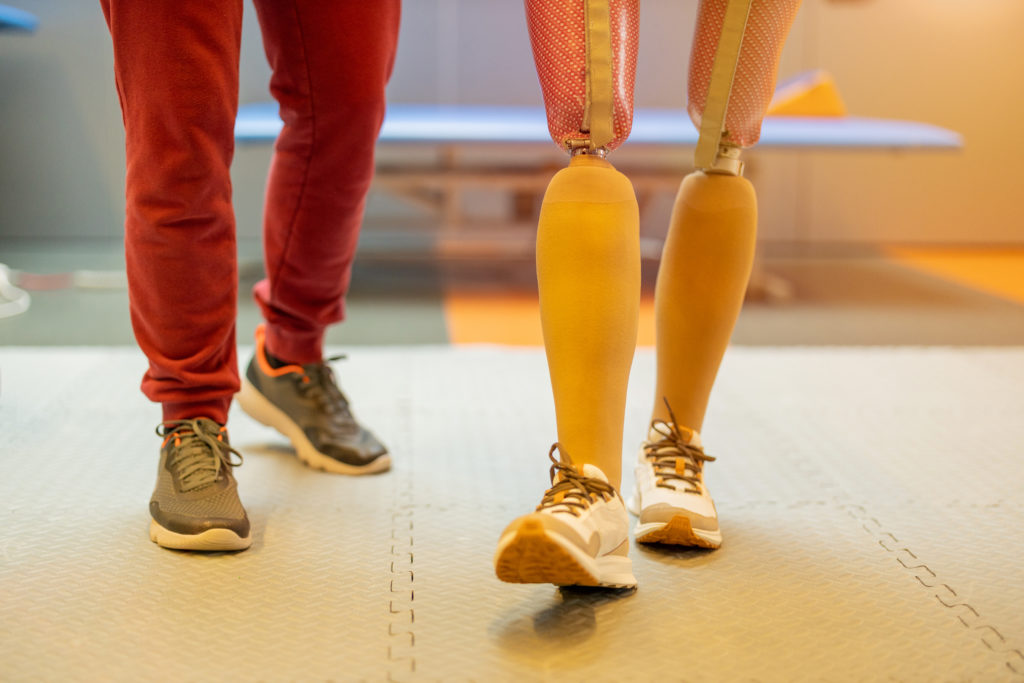Quick Hits
Daily brief research updates from the cognitive sciences

This is the type of study and insight I like. Kind of amazingly simple but effective. Though my headline may seem like promising the world, it isn’t. It simply focused on research into amputees and how they regain movement with artificial limbs of all sorts.
Simply a matter of training you may say. Kind of, but it is a painful and slow process because the body and brain are wired to work with the limbs you had and when they are gone it is a long frustrating process to regain functional movement.
And recent research by Szu-Ping Lee of the University of Nevada, is showing that attentional focus, an issue of the mind, is key to getting this right. This is grounded in sports kinesiology research particularly that of Professor Gabrielle Wulf.
The general approach is to focus on what muscles or joints need to coordinate to make a movement this is similar to what happens in sport. For example, in golf you will be focused on getting the right movement to make your swing, or in baseball, or soccer, or whatever sport it is.
This is an internal focus whereby you are trying move specific muscles or limbs in a complex coordination. The idea of course sounds logical: to get a specific movement you should coordinate your body internally.
However, external focus is different, it focuses only on the outcome. So, in the case of using prosthetics for amputees rather than focusing on the internalised processes you focus on the external: just move, just balance. For example, in golf when putting, you may focus on all internal cues, or simply focus on getting the ball in the hole.
Internal focus can lead to higher frustration with the prosthetic feeling like an additional lump and therefore inhibiting effective usage, whereas external focus focuses on outcomes and so integration of everything to achieve that outcome.
The paper just out focuses on rehabilitation of 21 patients and shows that most of the verbal instructions in therapy are focused on internal cues. Whereby Wulff’s research shows that external cues are more effective. This is by the way also the specialists curse – physical therapists are specialists in how movements connect together so can fall into the trap of getting to internalised rather than just focusing on the simple external cue.
But for now, it is not really mind over matter but changing mind focus to move more effectively – we know that focusing on outcomes rather than internal cues is more effective. This could be true in many areas in life.

Andy Habermacher
Andy is author of leading brains Review, Neuroleadership, and multiple other books. He has been intensively involved in writing and research into neuroleadership and is considered one of Europe’s leading experts. He is also a well-known public speaker, speaking on the brain and human behaviour.
Andy is also a masters athlete (middle distance running) and competes regularly at international competitions (and holds a few national records in his age category).
References
Szu-Ping Lee, Alexander Bonczyk, Maria Katrina Dimapilis, Sarah Partridge, Samantha Ruiz, Lung-Chang Chien, Andrew Sawers.
Direction of attentional focus in prosthetic training: Current practice and potential for improving motor learning in individuals with lower limb loss.
PLOS ONE, 2022; 17 (7): e0262977
DOI: 10.1371/journal.pone.0262977
More Quick Hits
Behaviour at eight helps predict midlife health behaviours
A long-term study in Finland has tracked children from the age of eight until the age of 50 and a new analysis of the data, just published, has looked at some of the correlations between socioemotional behaviour in childhood and later life achievement and health...
Psychedelics and consciousness
Psychedelics change our conscious experience of the world – that is part of their attraction. Now a new study out of John Hopkins Medicine has analysed data on attributions of consciousness to other animals and innate objects by those using psychedelics and how this...
Lower smartphone usage increases wellbeing
So much has been said about smartphone usage in modern times. This ranges from some who say that they are destroying our brain to others who see they benefit our cognition by outsourcing cognitive heavy tasks like remembering lists of phone numbers – thereby freeing...
Modesty preferred for cooperative teams
In an age where it appears that many people are vying for self-esteem especially through social media, this research is interesting. Particularly in business contexts where cooperation is king. Research has previously shown that appearing to be wealthy increases...
Poverty shrinks babies’ brains
Quick HitsDaily brief research updates from the cognitive sciences couple of studies have just been released which look at the brains of newborns and young babies. The results are worrying for any society. Brain scans of newborn babies from...
Babies born with five from seven functional brain networks
In the 1950s the blank slate theory was the most prominent theory ascribed to babies. They are born blank slates and then their experiences allow them to develop their networks thoughts, associations, etc., and just about everything else. Though this theory is long...






